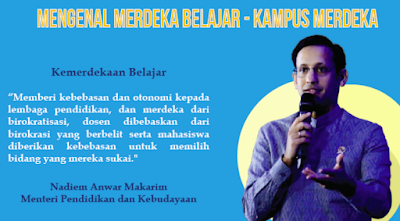Higher education is a place to produce intellectual students. All the hopes of the nation will rest on students and the academic community. Various efforts have been made to improve the quality of higher education, one of which is the implementation of a new policy, namely "Kampus Merdeka" which was released on January 24, 2020 by the Minister of Education and Culture, Nadiem Makarim.
However, every policy will always reap the pros and cons. Nadiem Makarim's new policy cannot be separated from criticism, one of which is the fourth policy. Many people argue that this policy arguably strengthens the commercialization of education. This kind of educational orientation will actually create a ready-to-work workforce, not improve the quality of knowledge. If we explore deeper about this policy through the guidebook of Merdeka Belajar issued by the minister of education and culture, the criticism is not entirely true. In the guidebook we will find that student interest is more directed to be achieved with this Merdeka Belajar program.
There are eight forms of learning activities in this Kampus Merdeka, namely student exchanges, internships or work practices, teaching assistance in educational units, research, humanitarian projects, entrepreneurial activities, independent projects, and thematic real work lectures (Republika.co.id, 2020). From the eight activities students can choose freely according to their interests. In other words, the Kampus Merdeka policy will be able to give students flexibility to study across disciplines. Students will have more freedom to express themselves in terms of creativity. In addition, the field program is expected to be able to get students closer to the community directly.
The
effectiveness of this policy has begun to be felt by a lecturer at the Faculty
of Economics and Communication at Bina Nusantara University, Margana
Wiratma. Reporting from BeritaSatu.com,
he said that internships for students for two or three semesters could make
them work professionally. As long as he is the enrichment program supervisor at
his campus, from the overall evaluation, the average internship student can do
well in the third month. He also revealed that the Kampus Merdeka policy was
actually mutually beneficial for all parties. The university gets input from
the world of work, and student reports become teaching materials for adjusting
courses that are able to answer real-world needs. Meanwhile companies can get
skilled workers. In addition, students
also gain new experience and skills at work (BeritaSatu.com, 2020).
So, every new policy in the field of education cannot be separated from the aim of making education in Indonesia more advanced, innovative, productive, and able to compete at the world level. Everything that students learn during the four years on campus is closely related to the world of work, the purpose of lectures is definitely to equip us to be better prepared for work. When students graduate, it is certain that what they need is a job. With this Kampus Merdeka policy, it is hoped that it can prepare graduate students to become creative and innovative prospective workers who can match the demands of the working world which is increasingly advanced. If this policy is implemented properly and the supporting components for the success of this policy have been well prepared, this policy will run smoothly and successfully. There is nothing wrong with trying new policies to improve the quality of education in Indonesia.


















No comments:
Post a Comment